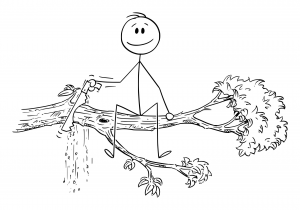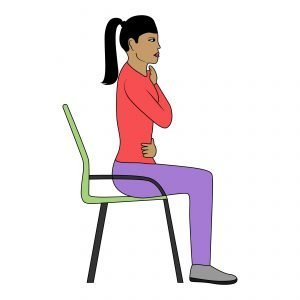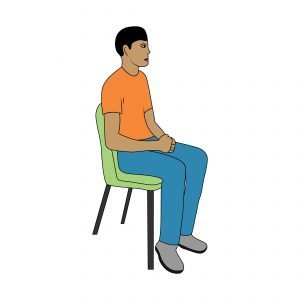Feeling Overwhelmed

I know you are not going to want to read or do any of the exercises here. I have been there. It is normal; when we are feeling overwhelmed we are robbed of self-motivation, left in its place is a desire to do things that will give us short term comfort. Like filling your boat with water doing these will only sink you further.
In this article, I’m going to show you strategies to get out of this trap and if you use these continuously they will help you feel better on a day to day basis.
Healthy and Unhealthy Coping Mechanisms
Rather than watching T.V for hours on end, sleeping excessively, drinking too much alcohol, overeating, constantly checking social media or mindlessly scrolling news articles… whatever it is that you want to do now, challenge yourself to not do it. Instead, ask yourself what are some things you can you do and get lost in doing them? These are different for everyone, some people; cook, bake, lift weights, run, write, draw, read, grow or tend to plants, listen to music, play an instrument, paint, study, DIY. It helps to make a written list of what you already know makes you feel worse and then make a list of things to try to get busy at. When you write these down, ideas will come to you sooner and you will also have a plan that you can follow.
Coping Skills
Coping Statements
The maxim of “there is nothing to fear but fear itself” is nonsense. It is better for us to not be afraid of our negative emotions. Telling yourself not to feel a certain way or denying your feelings only puts extra pressure on you. Try to accept the initial discomfort and carry on with your plan. Coping statements which have been shown to help chronic pain sufferers endure pain can be used as a way of overcoming the physiological effects of emotions. Read these and see which of them works for you:
I have done this before, and I can do it again
These are just feelings, they will go away when I’m busy
I may not feel like doing this now, but if I cope and carry on then I will feel better
I don`t need to rush, I can take things slowly
I’m stronger than I think
What do I need to do right now?
Step by step until it’s over
I don’t need to eliminate stress, just keep it under control
Small Chunks
What we are telling ourselves to do and how we are asking ourselves to do it often exacerbates our stress: We tend to lump our planned activities together and treat everything with a similar difficulty. This makes us unsure of our coping skills.
A good idea, therefore, is for you to sort the tasks that you need to complete into small manageable steps. Beginning with the easiest tasks and working your way up to the most challenging. You don’t have to carry out the tasks in that order, some of my students feel more comfortable with finishing the hardest tasks first.
No matter how you do it, scheduling your tasks will give you a sense of control over your day. Your day will seem less daunting when it is broken up. More importantly than this, you will become used to the idea, that even though you feel a particular way, you can carry on and get things done. Your feelings will not stop you. You will change the belief that you cannot cope when you are feeling overwhelmed.
The Coping Triad
We are complex beings and live complicated, stimulated lives. This can cause us to forget, ignore or reject our most primal reason for persevering: Our purpose.
Having a purpose is not about aspirations like being rich, or successful. It is also not about the goals that you set for yourself in life. Rather, it is the reason why you have goals and aspirations. Everything that you love to do and that is good for you is down to your purpose. We all share the same one: It is to look after yourself and others. Others can be family, friends or people whom you feel rewarded by when you give them help.
If we know and strive to carry out our purpose our lives can be fulfilling. We can have the direction and resilience to keep trying the things that we love, the things that are good for us. We are also more able to deal with the things in life that are monotonous or not good for us.
Nasal Diaphragmatic Breathing
The way we breathe can either aggravate our calm our emotions. Fast upper chest mouth breathing is associated with the fight, freeze or flight response. We don’t need this kind of reaction when we are sitting at home in our kitchen. Nasal diaphragmatic breathing which is a long-winded way of saying belly breathing through your nose is used to calm panic attack sufferers and will work for you too:
1. Sit upright or lie down on the floor, get comfortable.
2. Close your mouth, breathe in and out through your nose. Do not be concerned if your nose is blocked, it will become clearer as you use it.
3. Put one hand on your belly. Notice it rising as you breathe in and falling as you breathe out. Place the other hand on your chest, try to keep this hand from moving.
4. Just focus on feeling the rising of your belly as you breathe in, and the falling of your belly as you breathe out. Do this for a while.
5. When you are ready, after you breathe out, hold your breath for 3 seconds, count it: 1, 2, 3 then breath in. Calmly breathe out and count again 1,2,3. Repeat this breathing pattern of holding your breath after you breathe out for at least a few minutes or until you feel at ease.


Chasing Thought
The next step for us is to have a look at our thinking. This is where much of our suffering originates. Outside of real threats, it is our unhelpful thoughts, not the things that happen to us that trigger our feelings of being overwhelmed. These kind of thoughts are automatic, we cannot stop them from coming to the surface of our mind, but we can manage their effects. The trick is to catch them when they creep up on us and not run after them.
Go to your breath
When we catch these thoughts occurring and switch our attention to our breath like it is the most important thing in the world for us, it will move us to a place outside the chatter of our minds. This has the indirect result of quietening our inner monologue. Practise the following exercise for as long as you can, don’t be concerned if your mind wanders, this is normal. It takes time to develop concentration. The aim for you right now is just to try it.
- Sit upright but comfortably, clasp your hands together or place them on your thighs.
- Close your eyes, close your mouth. Place your tongue at the roof of your mouth.
- Try to picture your thoughts as being like clouds in a distant blue sky, lightweight and separate from you. Just accept and observe them. Do this for a short while.
- Listen to your breathing, try to make it as quiet and gentle as you can.
- Follow your breath as it moves into your nostrils and makes its way down into your body.
- Feel how your belly moves as air enters and leaves your nostrils. Focus on this journey of air.
- If your attention wanders and you start thinking, just accept it and go back to listening, following and feeling your breath.
Balanced Views
When we are feeling overwhelmed, our thoughts about ourselves and our situations are negative rigid and repetitive. Our thinking becomes framed by negative and confirming biases, we dismiss our strengths and only find evidence to support our worries. To get out of this style of thinking it helps if we break down what is happening and look for a more balanced view.
Take a pen and paper and answer these four questions: (write the answers down, as it is much more effective; you can throw the paper away when finished)
1. How do you feel and why do you think you feel that way?
E.g. I feel very anxious, I have to give a presentation tomorrow.
2. What are your thoughts?
E.g. I am thinking that I will be too nervous to do a good job, that I will mess it up and get fired.
3. Could there be there any alternatives to your thinking?
E.g. Yes, the last time I did a presentation I forgot to include some things, but it was fine. I remembered to mention them in the review at the end. I was nervous, but I carried on. I coped.
4. Can you do anything now that will make it easier for you to cope?
E.g. I can read my notes and look at some possible questions and ways to elaborate my key points.
Recap
Finding and implementing ways to cope and carry on is exactly what we don’t like to do when we are feeling overwhelmed. Try to remember though that the initial discomfort will pass. There are many things we don’t like doing at the start. Starting and continuing on despite our thoughts and felt emotions is the greatest habit you can form. We take control, it is this that gives our lives freedom. Whether you do one or all of the exercises on this page, your ability to create this habit will grow.







